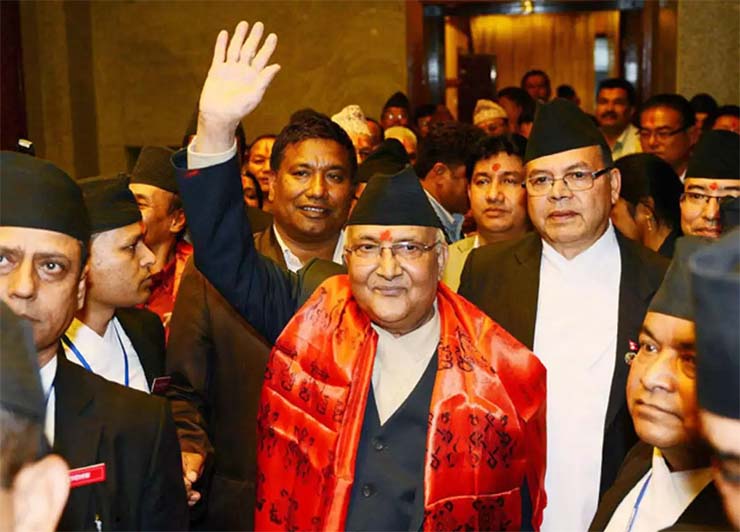
This question has gained salience more in the background of the fact that he will survive at the helm of the country’s affairs not at the pleasure of President Bidya Devi Bhandari but at whims and fancy of ex-Prime Minister and Communist Party of Nepal-Unified Marxist-Leninist Chief, K P Sharma Oli-—a pro-China leader who revels in attacking India.
Prachanda, whose Communist Party of Nepal-Maoist Centre has only 32 seats, is backed by Oli’s CPN-UML which has won 78 seats in the 275-member House of Representative. To have a simple majority of 138 members, the government headed by Prachanda is also backed by other smaller parties like Rastriya Prajatantra Party, Rastriya Swatantra Party and Janata Samajwadi Party. But these parties would not be as much in the driving seat as the CPN-UML in the new dispensation of Nepal.
However, Prachanda is well known for wearing a China card on his sleeve and he has shown it in clear terms when he inaugurated Beijing funded Pokhara International Airport on January 01. Constructed with a $216 million loan from China, the airport is just 75 km from India’s border and 85 km from China’s border, generating a huge concern among Indian strategists. There is a fear that if Beijing fails to turn this loan into a grant, Nepal will be not able to return it to China and then like Sri Lanka, which had to surrender Hambantota Port to Beijing on a 99-year lease, the Himalayan country may also have to do the same with the Pokhara airport. If it happens it will have a bearing on India’s security.
In the past too, Prachanda has never kept Beijing in any guessing game on the advancement of the Chinese footprint in Nepal, but K P Sharma Oli is seen as a stronger mover and shaker of Chinese interests in the Himalayan country. The CPN-UML leader is considered to be more ideologically driven towards China than Prachanda.
In fact, Oli who has been the Himalayan country’s Prime Minister thrice—from October 11, 2015 to August 3, 2016, from February 15, 2018 to May 13, 2021 and from May 13, 2021 to July 13, 2021—has been instrumental in making Nepal a part of China’s controversial Belt and Road Initiative. To give China a strong footing in the Himalayan country, Oli during his visit to Beijing in June 2018 presided over the signing of a cross-border railway which is also named the Trans-Himalayan Multi-Dimensional Connectivity Network.
When Xi Jinping visited Nepal in October 2019–a first by the Chinese President since 1996, the Himalayan nation was then helmed by pro-China Nepalese leader Oli. In fact, Oli is China’s Man Friday who ensures that India is not left to live in peace with the Himalayan country despite sharing an age-old connection of history, culture, tradition and religion.
He has been silent and so has been his party, the CPN-UML, on the “salami-slicing” of Nepal’s territory at multiple places by the People’s Liberation Army of China. But without any consternation, the Himalayan nation under his leadership in 2018, issued a new map for the country which included land that belonged to India.

Since Oli will never give up his ambition to emerge as a stronger leader and will like to call shots on issues which will help him further his political goals, he will nudge Prachanda on controversial subjects like the ‘Agnipath’ scheme of India. Due to elections in November 2022, Nepal had put on hold its decision on the recruitment of Gurkhas under the scheme, stating that a call on it will be made only after a new government is formed. Within the Himalayan country, a strong reservation against it pervades among people. There is concern that Gurkhas recruited under Agnipath scheme will come back to Nepal in a few years, without the wherewithal of what to do next in their lives. It is feared that with no long-term engagement, they can go into alcoholism, drugs and may even join some sort of insurgency as they will be trained in battle.
To keep China in good humour, Prachanda backed by Oli will, in all likelihood, annul the 1947 tripartite agreement signed between Britain, India and Nepal on the recruitment of Gurkhas into armed forces. Nepali Communist parties have several times in recent years questioned the tradition of Nepal, a sovereign nation, sending its youth to fight for others. They have called the tradition humiliating and avaricious. China will be happier if Nepal stops its youths’ recruitment in Indian armed forces as they are known for their valour, devotion, and hardiness. In August 2020, the Chinese embassy in Kathmandu asked the China Study Centre, a think tank to find out why Gurkhas were joining the Indian army. The Chinese embassy also tasked the non-profit group to study what was the socio-economic impact on Nepal amidst the China-India standoff.
In view of such invasive interests of China regarding Nepali Gurkhas, it would not be any more surprising if Nepal under Prachanda may influence Nepali youths’ recruitment in the Chinese PLA. Earlier, China had attempted to sign an agreement with Nepal to recruit Gurkhas, but it was turned down by Kathmandu. Given that Chinese army soldiers are no match to Indian army jawans in terms of toughness and agility, Beijing has no second thought on the recruitment of Nepali youth in the PLA. It wants them to be part of its armed forces when it is facing India on the Line of Actual Control. But the major question is: Will Gurkhas who are closer to India–heart and mind, ever accept Chinese bait, knowing fully well that they will never get the same respect and adoration they get in the Indian army.
–The writer is a senior journalist with wide experience in covering international affairs. The views expressed are of the writer and do not necessarily reflect the views of Raksha Anirveda.








